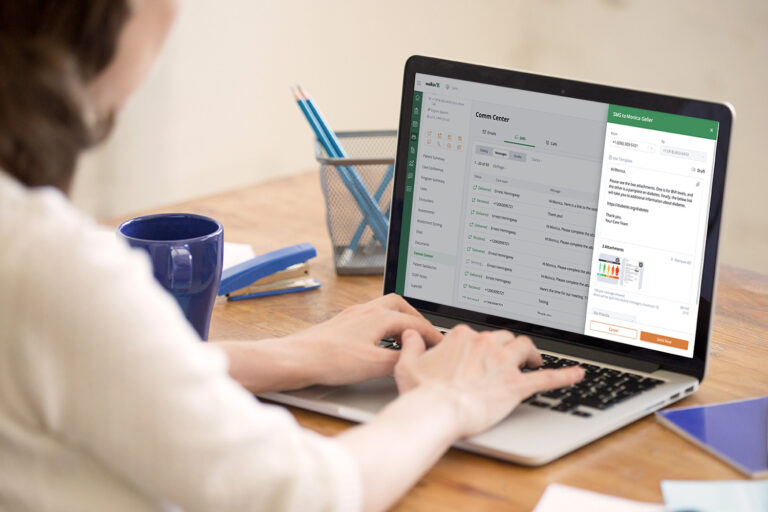Innovative Care Management is a suite of services that enables care teams supporting a continuum of care to help preventive, follow-up, and chronic care management patients manage and improve their health, while making utilization management more cost-effective and streamlined.
By improving care coordination, reducing hospital visits, and boosting patient engagement, Welkin’s innovative Care Management platform can give significant support to healthcare providers — from medical directors to RNs — who want to leverage innovative Care Management. This proactive healthcare tool will help them meet their goals, enhance their team’s medical management, and boost their job satisfaction.
Whether for inpatient or outpatient care, truly innovative Care Management streamlines workflows and enables healthcare providers, patients, and their caregivers to work together to improve high-risk healthcare management in both outpatient and inpatient care centers.
Why implement proactive care?
Some healthcare professionals may ask how innovative Care Management will benefit them and whether it will organically lead to proactive care for inpatient, outpatient, emergency healthcare management, and utilization management.
Transitioning to rigorous, consistent proactive care will help medical directors detect and address high-risk healthcare management cases, detect dysfunctions across diverse inpatient and outpatient populations earlier, and improve outcomes with greater agility — all while alleviating healthcare provider burnout with innovative Care Management.
Medical directors across the country are discovering that proactive, cost-effective healthcare helps their teams achieve the following for high-risk patients:
Reduce care barriers
Proactive care delivered via innovative Care Management platforms enables healthcare providers to integrate social determinants of health, supporting patient populations who may lack access to clean air and water, nutritious food, medication, transportation, education, or eligibility to close those gaps.
A cost-effective innovative Care Management model requires a 360° view of each patient and regular monitoring in both outpatient and inpatient settings. Along with the traditional vital signs and symptoms, it also tracks economic, lifestyle, and high-risk community factors, which often comprise a substantial portion of a patient’s wellness. The pandemic placed these hidden disparities in the spotlight — innovative Care Management is helping to keep them there.
Improve health outcomes
Proactive teams who leverage innovative Care Management platforms are agile condition management experts. From preauthorization to eligibility, plan inclusion, and HIPAA-compliant healthcare management, they track high-risk patients through the entire journey. Ensuring that clinical information remains safe and secure is another critical advantage of innovative Care Management for both patients and healthcare providers.
Whether it’s a medical director sharing clinical information or a nurse practitioner researching treatment eligibility, proactive care prompts healthcare providers to share medical management data with patients more regularly. Innovative Care Management allows this to happen naturally and collaboratively. This builds trust and inspires patients to adhere to treatment plans, take medication as directed, and fill out clinical information forms more honestly. When a medical director implements consistent innovative Care Management, high-risk patients participate in their care — improving health outcomes, patient retention, and referrals.
Lower healthcare costs
Unlike reactive care, proactive care incorporates more than HIPAA-compliant healthcare management with detailed datasheets — it requires holistic care of patients and follow-ups after they leave a healthcare facility. Standardizing innovative Care Management requires rapid, agile policy and healthcare culture shifts.
In responsible healthcare, it’s not reasonable to deliver a wildly more expensive or untested treatment for outpatient care when there is an adequate and more cost-effective option available. Medical necessity is the concept that healthcare services and resources must be necessary and appropriate for the assessment and management of a condition, illness, or injury. The care must be considered reasonable when judged against current healthcare standards. Medical necessity guidelines are not strictly black and white; they merely provide guidance, not mandates.
Proactive care standards inherently protect against medical necessity denials by encouraging healthcare provides to deliver the most reasonable, necessary, and appropriate healthcare services available. As they collaborate to determine which care plan is optimal for each patient, innovative Care Management platforms can streamline their decision-making, allowing them to make healthcare an art and a science.
Why proactive care teams need innovative Care Management
Effective technology makes inpatient and outpatient medical management less tedious, more transparent, and infinitely more satisfying for healthcare providers because it leverages innovative Care Management to achieve the following:
Streamlines healthcare processes
High-risk healthcare management requires demonstrating medical necessity, which determines whether the service will get reimbursed. An innovative Care Management platform enables healthcare providers to process these requirements more efficiently.
Certain healthcare services, such as referrals to specialists, hospitalizations, and outpatient surgeries, require preauthorization. The Medical Director oversees all decisions denying coverage for services for reasons of medical necessity. In the event of a denial, providers and members will be informed by letter of the appeal process as well as any unmet criteria, standards, and guidelines.
To expand its reach and efficiency, your care team needs to find an innovative Care Management solution that meets each clinician’s workflow requirements and streamlines patient communication about the various procedures required throughout the care journey. From medical necessity assessment to eligibility screening, preauthorization, and treatment planning for high-risk patients, innovative Care Management platforms streamline decision-making.
Every medical director’s healthcare team strives to make utilization management more cost-effective, and a team-first innovative Care Management platform allows them to do just that. It can also help make inpatient and outpatient care delivery more collaborative and clinical information sharing much easier — from anywhere.
Improves outcomes
According to a study published in Harvard Business Review, medical directors who implemented innovative Care Management solutions saw a 96% medication compliance rate. The same patients with chronic conditions who came in for inpatient emergency room visits a few times per year gradually stopped visiting altogether. Instead, they scheduled minimal outpatient visits, saving money and potentially risky interventions.
Remotely sharing clinical information with healthcare providers and regularly communicating about medical necessity, eligibility, preauthorization, and other medical management processes created a better workflow for engaging with patients, which improved their outcomes. Innovative Care Management platforms allow providers to share protocols quickly and efficiently and communicate about medical necessity for high-risk patients discreetly and productively.
A report published in Deloitte Insights describes how innovative Care Management platforms onboard, educate, and engage patients much earlier in the condition progression, driving better outcomes. These omnichannel platforms include case management services like patient portals with patient messaging, intake, inpatient and outpatient appointment scheduling, appointment reminders, and dosage reminders via mobile apps, email, or SMS.
When clinical information and messaging live in one transparent, HIPAA-compliant place, healthcare provider collaboration becomes less time-consuming and more cost-effective. Innovative Care Management streamlines their days. The more timely and relevant their clinical information, the less often healthcare providers need to dig around or ask other healthcare professionals for help.
Data-driven innovative Care Management solutions allow clinicians to “hyper-target” patients according to disease stage, age, or treatment, as well as a preferred communication channel — another medical management shortcut that saves time and energy.
Alleviates burnout
Medical directors and healthcare professionals in both inpatient and outpatient care may have slightly different preferences and priorities when choosing an innovative Care Management platform to determine eligibility, manage preauthorization, or communicate with team members about medical necessity. Implementing a platform that efficiently stores and shares clinical information and streamlines workflows makes medical management more cost-effective and clinician-friendly.
Cost-effective inpatient and outpatient care delivery requires transparency and a higher-quality user experience to alleviate burnout and enable healthcare providers to see more high-risk patients while minimizing lower-risk case management services with regular remote patient monitoring. The cost-savings enabled by patient self-management via innovative Care Management platforms relieves healthcare providers’ monitoring burden. Less stress means better healthcare management.
Medical directors are demanding innovative Care Management solutions that make clinical information accessible and easy for patients to understand. They may need it to integrate old electronic health records (EHRs) with new, real-time clinical information and make outpatient and inpatient visits and protocols accessible to all healthcare specialists.
Innovative Care Management platforms with role-based access allow medical directors to decide daily which team members need clinical information access and when. Codeless program editors allow them to define their team’s roles, functionality, and access to clinical information like medical necessity assessments, eligibility, and preauthorization status for each patient. A truly innovative Care Management platform enables them to easily modify protocols and simplify medical management for outpatient or inpatient care — all without engineers or specialists.
Patients and medical directors who leverage innovative Care Management solutions can also access third-party app integrations that enable healthcare providers to connect a wide range of apps for various conditions, expanding their healthcare management capabilities. Whether practicing telehealth via video conference or simplifying a lab order, apps enable more cost-effective case management services.
Expands patient outreach
Healthcare providers can spend more time delivering outpatient and inpatient case management services when their time is not spent on patients who repeatedly visit the emergency room. The National Institutes of Health found that effective Care Management solutions improve the efficiency of patient-provider communication, enhancing utilization management.
When care coordination and HIPAA-compliant, innovative Care Management are automated, patients become more involved in their healthcare. Fewer need inpatient surgery or get discharged to inpatient rehabilitation centers. More of them take their healthcare management into their own hands, improving the patient experience. This bolsters relationships with healthcare providers and provides cost savings for both.
When outpatient healthcare management takes up less of their time, healthcare providers have more of it to share with high-risk patients with medical necessity and eligibility for inpatient procedures. Innovative Care Management platforms engage patients with chronic conditions, so they become more satisfied with their care and are more likely to refer friends and family, which helps you grow your practice.
Promotes cost-effective utilization management
The Brookings Institution found that innovative Care Management solutions improved the outpatient and inpatient experience by streamlining and improving the quality of clinical information and communication. The shift to patient-centered care helps all healthcare management stakeholders recognize the medical necessity of a clinical procedure or treatment and assess eligibility in a more cost-effective way. Innovative Care Management platforms are built into the patient portal from the beginning of the outpatient care plan. This streamlined form of medical management eliminates redundant appointments and time-consuming clinical information searches for more cost-effective utilization management.
Attributes of innovative Care Management
The most innovative Care Management platforms can help medical directors and their healthcare organizations streamline not only clinical information-gathering but also the entire medical management journey. These cost-effective platforms can be scaled up to meet the needs of inpatient or outpatient care centers to match plan inclusion requirements. They can also be scaled down to suit the medical management needs of smaller primary healthcare practices.
In all cases, however, EHR integration is paramount to the successful implementation of innovative Care Management platforms. Below are the critical attributes to look for when choosing yours:
- Patient profiles: Give your medical management a centralized view of the clinical information including diagnosis, assessments, medical necessity, eligibility, preauthorization, and care plan details, along with charts and graphs to track vitals and lab results.
- Clinical workflows: Innovative Care Management workflows feature scoring assessments, clinical notes, trending data, care plans, lab ordering and results, and electronic prescribing for inpatient and outpatient care.
- Therapy types: Successful medical management supports individual, group, or relationship types, so look for innovative Care Management solutions that enable them.
- Communications centers: Native and integrated voice, video, secure email, and SMS — plus HIPAA-compliant, in-app chat messaging — enhance your clinical information access and medical management capabilities via innovative Care Management platforms.
- Document management: Built-in functionality for e-consent of HIPAA waivers and consent forms that are auto-stored within the patient profile streamline both inpatient and outpatient care within an innovative Care Management platform.
- Alerts, tasks, and notifications: Define your innovative Care Management platform beyond alerts with tasks and notifications to overcome alert fatigue and drive more actionable behavior. Alerts and notifications can be triggered to notify healthcare providers during off-hours via email and SMS.
- Automation: Enhance case management services by creating rules and conditions which use trigger events to automate medical management workflows within an innovative Care Management platform.
- Security and compliance features: Geographical, role, and attribute-based security as well as audit trails and security logs ensure that your clinical information is highly secure (for organizational security, MFA and SSO make medical management less stressful).
- Offline modes: Allow healthcare providers to access clinical information while in the field in low-bandwidth environments so they can synchronize healthcare management updates once back online.
Test-run the most innovative Care Management solution on the market
If your care team is ready to level up your clinical information gathering and streamline the entire medical management journey, try our cost-effective innovative Care Management platform and see how easy it can be to improve your patients’ outcomes and your care team’s job satisfaction. Schedule a demo.


